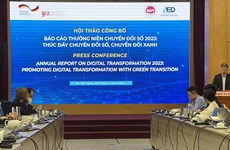ASEAN nations bridge rural digital gap
The digital gap between rural and urban areas remains a challenge for
people in the rural communities of ASEAN member countries, who struggle
to get better access to key services such as education and healthcare.
The digital gap between rural and urban areas remains a challenge for
people in the rural communities of ASEAN member countries, who struggle
to get better access to key services such as education and healthcare.
The challenge prompted information and communication technology (ICT) experts from ASEAN member countries and IT groups to gather at a conference on Sept. 21 in Hanoi to examine ways in which ICT can bring more efficient key services to people living in rural areas.
The three-day ASEAN rural connectivity conference for education and development also highlights the building of ASEAN-US public-private partnerships to facilitate the financing of underserviced rural areas of ASEAN.
Dr Somsak Pipoppinyo, Director of Finance, Industry and Infrastructure Directorate of the ASEAN Secretariat said rural information and communication technology (ICT) needed to be promoted in rural areas by increasing access, improving quality of services and availability of applications. This will help narrow the digital gaps between urban and rural areas and offer more digital opportunities.
ASEAN leaders in October last year ratified a master plan on ASEAN connectivity which encompasses three key elements of physical connectivity (energy, ICT, transport), institutional connectivity and people-to-people connectivity, he said.
Regarding financial issues, Jun Labadan from the ASEAN-US Technical Assistance and Training Facility said challenges were numerous. Challenges include raising the amount of infrastructure required, providing Internet access, upgrading facilities and training manpower for use and support.
He suggested solutions such as stimulating local Government financing, private public partnerships with local telecommunications companies and banks, grants and tie-in services that generate both service and income.
Regarding strategies for rural connectivity and technology in Vietnam , Vice President of the National Institute of ICT Pham Manh Lam said the Prime Minister in October last year approved projects for development of information and communications in rural area during the 2011-15 period.
"The project's target is to have 100 percent of communes in remote areas having post and telecom service and connecting to broadband network. Almost all people living in rural areas should have access to universalised post and telecom services," he said. /.
The challenge prompted information and communication technology (ICT) experts from ASEAN member countries and IT groups to gather at a conference on Sept. 21 in Hanoi to examine ways in which ICT can bring more efficient key services to people living in rural areas.
The three-day ASEAN rural connectivity conference for education and development also highlights the building of ASEAN-US public-private partnerships to facilitate the financing of underserviced rural areas of ASEAN.
Dr Somsak Pipoppinyo, Director of Finance, Industry and Infrastructure Directorate of the ASEAN Secretariat said rural information and communication technology (ICT) needed to be promoted in rural areas by increasing access, improving quality of services and availability of applications. This will help narrow the digital gaps between urban and rural areas and offer more digital opportunities.
ASEAN leaders in October last year ratified a master plan on ASEAN connectivity which encompasses three key elements of physical connectivity (energy, ICT, transport), institutional connectivity and people-to-people connectivity, he said.
Regarding financial issues, Jun Labadan from the ASEAN-US Technical Assistance and Training Facility said challenges were numerous. Challenges include raising the amount of infrastructure required, providing Internet access, upgrading facilities and training manpower for use and support.
He suggested solutions such as stimulating local Government financing, private public partnerships with local telecommunications companies and banks, grants and tie-in services that generate both service and income.
Regarding strategies for rural connectivity and technology in Vietnam , Vice President of the National Institute of ICT Pham Manh Lam said the Prime Minister in October last year approved projects for development of information and communications in rural area during the 2011-15 period.
"The project's target is to have 100 percent of communes in remote areas having post and telecom service and connecting to broadband network. Almost all people living in rural areas should have access to universalised post and telecom services," he said. /.













